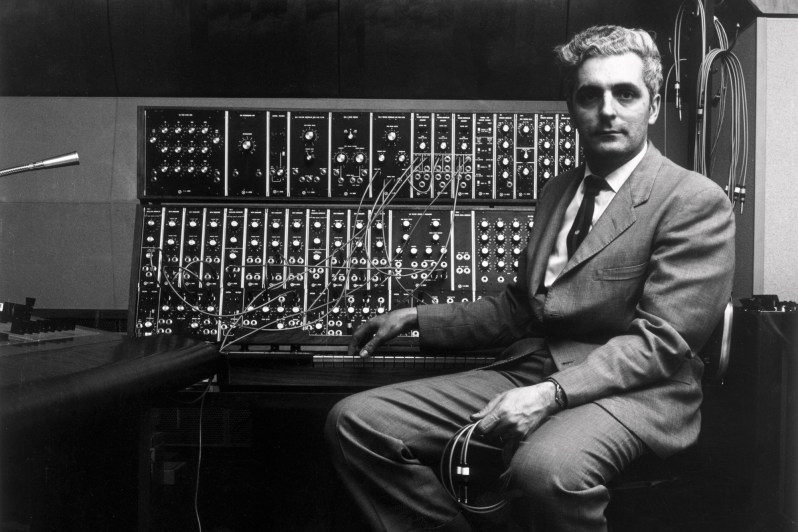
It’s been said many times: Some of the greatest inventions originated in garages and basements.
In music, this is especially true. It’s within these hallowed walls where some of the best bands on the planet were formed; where some of the most endearing songs in existence were written and put to music. It’s also where one of the most game-changing instruments of the last century was devised.
In the early 1960s, an engineer named Bob Moog started tinkering with keyboards. He’d been working with theremins for quite a while and had observed the impression the relatively new electric guitar had made on music. The guitar and amp combo essentially solidified the creation of rock ‘n’ roll as we know it. Moog was moved to do the same for the piano, arming it with an electric charge and some custom effects.

Enter the synthesizer, which Moog first assembled in 1964. He’s credited with creating the first commercial version, with the aid of composer Herb Deutsch. It was a busy year in culture: the Civil Rights Act was signed into law, the Beatles held the top five slots in Billboard’s Top 40, Lyndon Johnson was running the country, and the synthesizer was born.
Some of the inspiration for the instruments many bells and whistles came from less expected places. The envelope module, which accounts for the fading in and out of individual notes, was modeled after a doorbell. Moog and Deutsch looked to the wah-wah pedal of a guitar (which very much does what it sounds like it would do) for filter ideas. In the end, they had a machine that would produce some pretty out-there sounds. Apparently, they entertained themselves in the early days by noting the confused faces of those within earshot.
The engineering was impressive. Thanks to modulators, oscillators, amplifiers, noise generators, and more, the synth could bend, enlarge, twist, and mutate typical piano notes. When the word got out, orders started to trickle in, first from brainy composers and avant-garde musicians and ultimately from mainstream channels. By the end of the musically rich ’60s, the synth was proving prominent in the popular sounds of bands like the Doors, the Monkees, and the Beatles.
When it first hit the market, there was nothing else quite like it. RCA had a similar contraption, but it was slower and dependent on pre-programmed cards. The Moog synth could be played in real time, was relatively small in size, and cost a fraction of what any of the inferior sibling devices cost, at around $10,000. Moog showed off his new creation at the 1967 Monterey Jazz Festival. His booth drew some attention and a few rock bands on the bill played around with the new machine.
One particular record is credited with really showcasing the potential of Moog’s creation. Released in 1968, Switched-On Bach showed the world that the synth could handle classical compositions as well. The record dragged Bach into the mid-20th century in style and brought home three Grammys en route. Soon, the Moog synth was showing up in Rolling Stones tracks and Beatles songs like Here Comes The Sun. A few years later, the prog-rock generation fully embraced the instrument, with bands like Yes fully utilizing its cerebral sounds.

The trippy nature of the synth appealed to jazz musicians, too, from Sun Ra to Herbie Hancock. Back then, the machine was relatively massive. Much like the earlier versions of the computer, the original Moog synth was a tower of circuits, nobs, and wiring, with some keys in the foreground. It’s a little reminiscent of the stereotypical black-and-white images you associate with old telephone switchboards, operators standing by.
Today, Moog is an iconic name on par with Fender guitars and Orange amplifiers. In fact, synth-pop and synth-rock are bona-fide genres, built around the spacey sounds of Moog’s lasting invention. It’s impossible to imagine bands like Devo, Kraftwerk, Gary Numan, Beach House, M83, Daft Punk, Animal Collective, and so many more without the instrument.
It’s a smaller machine now, as you might expect, and continues to evolve. Moog passed away in 2005 but his legacy is written in stone and played nightly on stages all over the world. There’s a foundation in his name, devoted to things like a museum and a sound school.
Much of the business history suggests that if Moog had been more aggressive, he could have really run the synth market completely. But it seemed like that wasn’t really his style. Moog was, after all, an enthusiastic inventor, fierce collaborator, and proponent of the creative process. This is a guy who left music for a professor role in his later years.
He’s certainly recognized, and not just by the countless musicians who flourish around the fruits of his engineering aptitude. Moog holds honorary doctorates from Berklee College of Music in Boston, Lycoming College, and the Polytechnic Institute of New York University. He earned a technical Grammy in 2002 and in 2013, the musically minded engineer was inducted into the National Inventors Hall of Fame.


